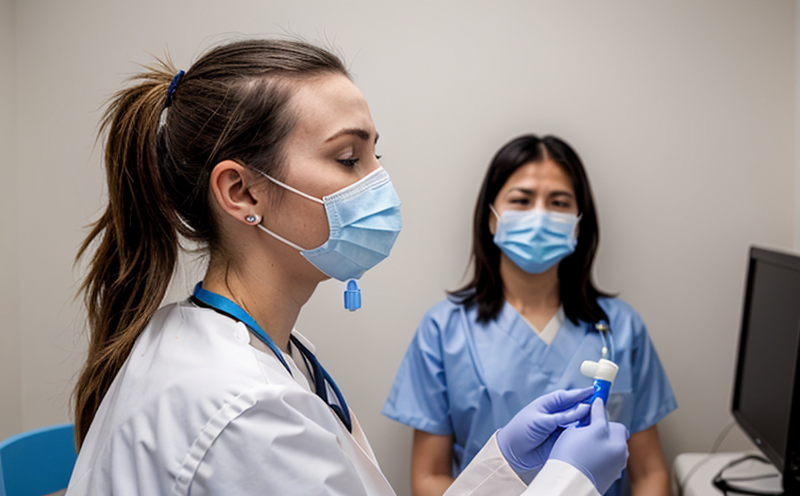Antigen Detection Testing for Respiratory Pathogens in Animals
Antigen detection testing plays a crucial role in identifying and diagnosing respiratory diseases in animals. This method involves the identification of specific proteins (antigens) associated with pathogens that cause respiratory infections, such as bacteria, viruses, or fungi. The process is particularly valuable for early diagnosis and rapid response to outbreaks, ensuring timely treatment and minimizing disease spread.
Respiratory diseases in animals can have significant implications for both animal health and human welfare. Animals may act as reservoirs for zoonotic pathogens, which can potentially infect humans. Efficient and accurate diagnostic methods are essential not only for the well-being of livestock but also to protect public health. Antigen detection testing is a sensitive and specific method that helps in the early identification of such pathogens.
The procedure typically involves collecting a sample from the respiratory tract, which may include nasal swabs, bronchoalveolar lavage fluid, or tracheal aspirates. These samples are then processed to extract and detect antigens using various methods like enzyme-linked immunosorbent assays (ELISAs), lateral flow devices, or real-time PCR-based antigen detection kits.
One of the key advantages of antigen detection testing is its ability to provide rapid results, often within a few hours. This speed is critical in managing outbreaks and implementing control measures promptly. Additionally, this method has a high sensitivity for detecting specific antigens, making it highly reliable for diagnosing respiratory infections caused by pathogens like Pasteurella multocida, Bordetella bronchiseptica, or viruses such as infectious bronchitis virus.
The use of antigen detection tests in livestock and companion animals helps in identifying the causative agents early, allowing for targeted antibiotic therapy or antiviral treatment. This approach is particularly beneficial in preventing the spread of drug-resistant strains, which can be a significant concern in animal health management.
Moreover, antigen detection testing plays an important role in monitoring and controlling respiratory disease outbreaks on farms and in veterinary clinics. By identifying pathogens quickly, veterinarians can implement containment strategies such as quarantine measures or disinfection protocols effectively. This reduces the risk of further spread within the facility and minimizes potential exposure to other animals.
The accuracy and reliability of antigen detection tests are supported by adherence to international standards such as ISO 15189 for quality management systems in laboratories, ensuring that results are consistent and accurate across different facilities. The use of these standardized methods ensures that the testing process is rigorous and reliable, providing confidence in the diagnostic outcomes.
The versatility of antigen detection tests extends beyond just identifying pathogens; they can also help in monitoring the effectiveness of treatments by detecting changes in the presence or absence of specific antigens over time. This capability is particularly useful for tracking the response to antimicrobial therapy or antiviral treatment, ensuring that the chosen interventions are effective.
In conclusion, antigen detection testing for respiratory pathogens in animals offers a rapid and reliable method for diagnosing infections, supporting early intervention strategies, and enhancing animal health management. Its role in preventing disease outbreaks and protecting public health makes it an indispensable tool in modern veterinary practices and livestock management.
Applied Standards
The practice of antigen detection testing for respiratory pathogens is governed by several international standards that ensure the accuracy, reliability, and consistency of results. These include:
- ISO 15189:2017 – This standard sets out the requirements for quality management systems in medical laboratories, ensuring that testing processes are robust and reliable.
- American Society for Testing and Materials (ASTM) F3486-18 – This guideline provides recommendations for the performance of antigen detection tests in clinical settings.
- European Committee for Standardization (CEN) – The CEN provides standards that ensure compatibility, interoperability, and safety across Europe. These standards are crucial for harmonizing testing protocols within a broader geographical context.
The adherence to these standards ensures that the tests meet stringent quality control measures, providing consistent results regardless of the laboratory performing the test. This standardization is particularly important in clinical and healthcare settings where accurate diagnosis can have significant health implications for both animals and humans.
Benefits
The implementation of antigen detection testing for respiratory pathogens offers several benefits that are critical in managing animal health effectively:
- Rapid Diagnosis: Antigen detection tests provide quick results, allowing for early intervention and treatment.
- Specificity and Sensitivity: These tests are highly specific to the targeted pathogens, ensuring accurate identification without false positives or negatives.
- Early Intervention: The ability to detect pathogens early helps in implementing containment strategies promptly, reducing disease spread.
- Treatment Monitoring: Antigen detection can monitor treatment effectiveness by tracking changes in pathogen presence over time.
- Zoonotic Pathogen Surveillance: By detecting zoonotic pathogens early, the risk of human infection is minimized.
- Cost-Effective: Early diagnosis and treatment reduce the overall cost associated with prolonged illness or widespread outbreaks.
Competitive Advantage and Market Impact
The adoption of antigen detection testing for respiratory pathogens provides significant competitive advantages in the market:
- Innovation Leadership: Early adoption of advanced diagnostic technologies positions a company at the forefront of innovation, enhancing its reputation among clients.
- Client Satisfaction: Offering accurate and reliable test results can lead to higher client satisfaction and loyalty.
- Regulatory Compliance: Adhering to international standards ensures compliance with regulatory requirements, reducing the risk of penalties or non-compliance issues.
- Market Differentiation: Providing a service that meets high-quality standards can differentiate a company from competitors offering less reliable testing methods.
- Premium Pricing Potential: High-quality diagnostic services often command premium pricing, increasing profitability.





